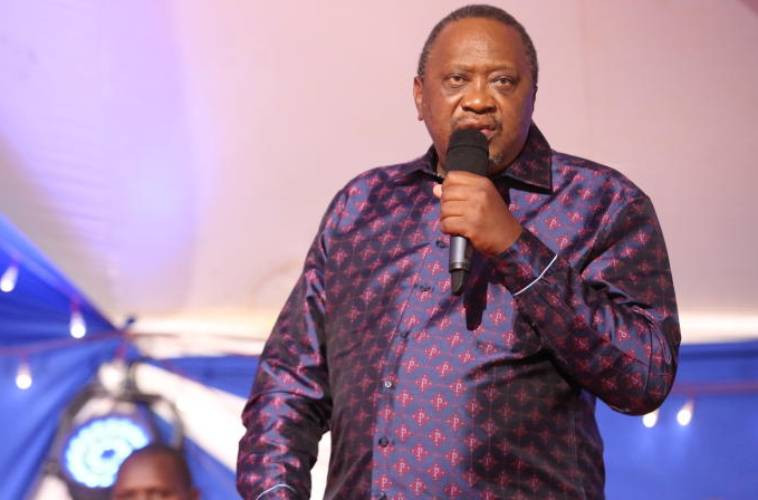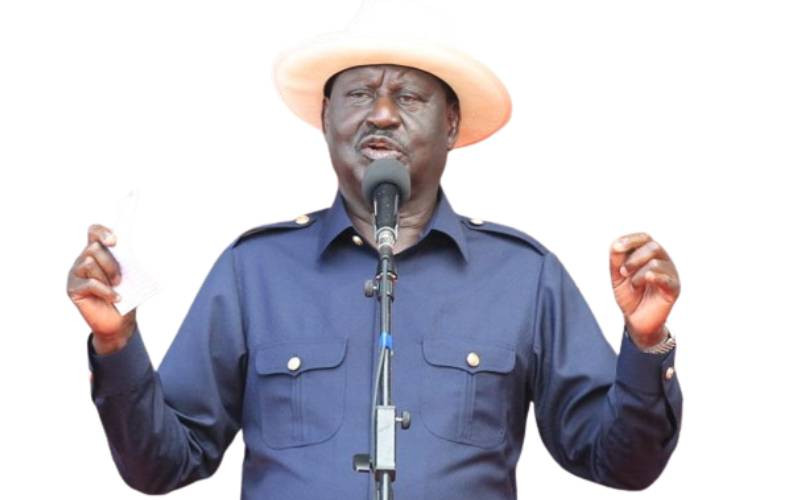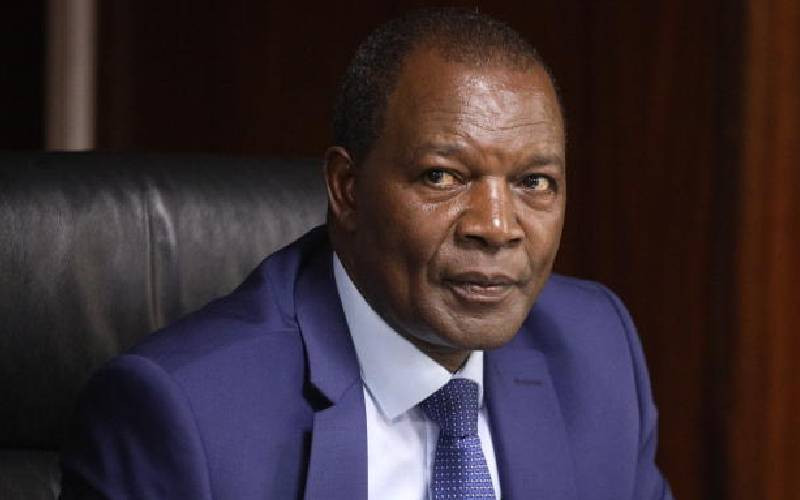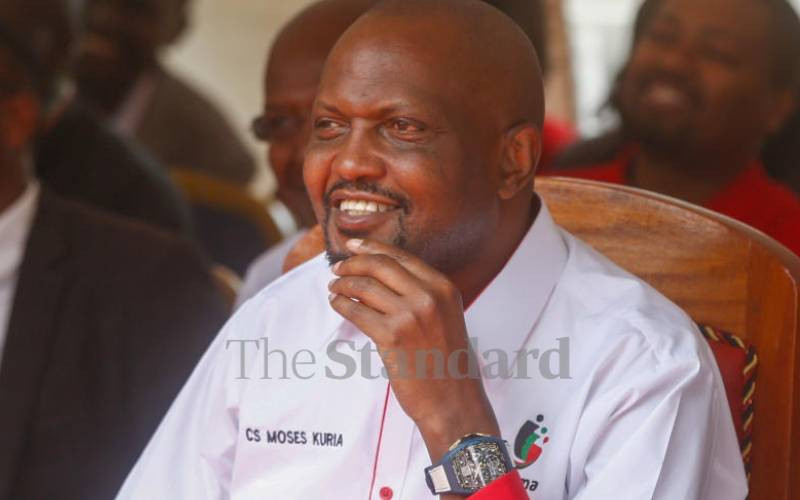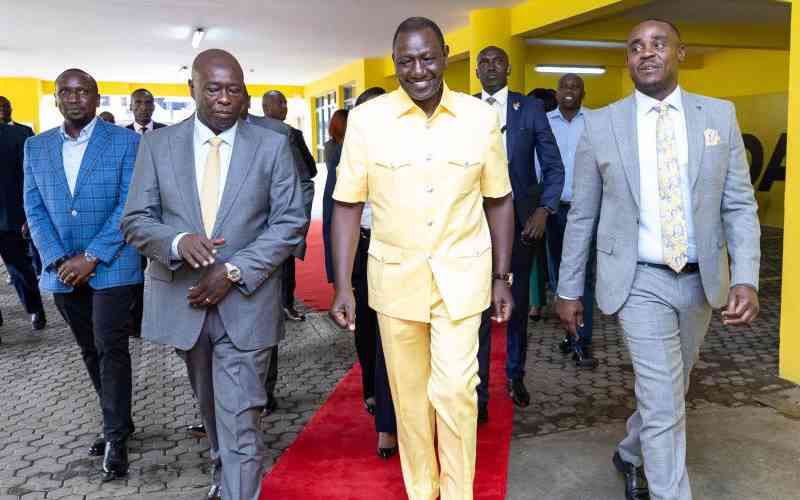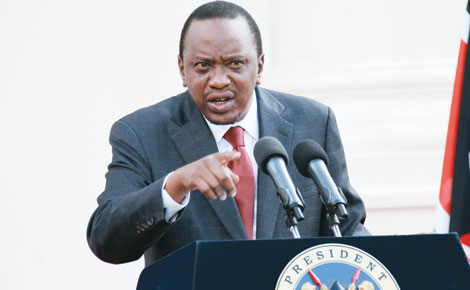 |
|
President Uhuru Kenyatta |
By MWANIKI MUNUHE
President Uhuru Kenyatta Friday came out to defend two highly controversial decisions that saw governors roundly condemn his government and the opposition CORD threatening mass action.
Uhuru, speaking at a press conference in State House, Nairobi, justified his decision to pay Sh1.4 billion to shadowy figures in the Anglo Leasing scandal.
The money is owed to two Anglo Leasing-type firms, First Mercantile Securities Corporation and Universal Satspace, following a court judgement against Kenya.
The decision by the president, who had fiercely opposed any payment to the firm in his days in the opposition, came just hours after another announcement that seemed to bring back the unpopular and loathed provincial administration.
Uhuru said the government would recover Sh1.4 billion that he has authorised to be paid to the two Anglo Leasing firms.
He said although the circumstances surrounding the floating of a sovereign bond and the court rulings have forced the country to make the payment, the government is in possession of credible evidence that will facilitate new investigations with an aim of recovering the money lost and prosecuting those involved.
“We will ensure that the money paid by the Government of Kenya is recovered. I ask the Ethics and Anti Corruption Commission to do everything to ensure that this money is recovered,” he said.
He said he believed Anglo Leasing was a scam, which must be investigated to its logical conclusion.
President Uhuru further said Kenya was between a rock and a hard place given the court ruling, and the country’s interest to secure the Euro bond worth Sh174 billion.
Justified action
“I found it necessary to make this payment because it was standing in the way in regard to the Euro bond. There is also a court ruling to this effect. We have shown the world that we are respecters of the rule of law. We must look for a way to recover this money, we can’t stop the country from functioning,” he said.
A few hours before he spoke, CORD leaders, led by former vice president Kalonzo Musyoka and Prof Anyang’ Nyong’o, said the president’s decision marked one of Kenya’s lowest moments in the war on corruption.
“The president’s unilateral decree for payment of Sh1.4 billion to the architects of the Anglo Leasing scandals is the lowest ebb in our struggle to combat corruption and endear prudent management of public resources in this country,” the leaders said.
But the president justified his action to delegate executive power to the county commissioners, saying, “What we have done is no different from what the county-level governments have been doing. Governors have felt that they needed county administrators in their areas to deliver the services which the county government is mandated to provide. Consequently, it would be hypocritical to claim that the national government does not need administrators to ensure that its functions at the grassroots level are properly carried out. We are not fighting for control, we are not pre-occupied with control,” he said
Stay informed. Subscribe to our newsletter
Asked how he felt now that his government would have to foot the Anglo Leasing bill, the president responded: “Terrible…terrible…terrible.”
President Uhuru however said the government should not lose such cases in future.
“The lawyers must up their game, we should not lose such cases in future and if we do, we must be told why.”
The president’s action follows a legal opinion by the Attorney General Prof Githu Muigai who described the decision to make the payment as the easier and safer choice.
The legal opinion dated April 3, 2014, advised the government to settle the negotiated agreement with companies that obtained a court ruling in their favour in relation to the Anglo Leasing contracts.
The advice reads in part, “The office of the Attorney General sought advice from English Solicitors on the chance of appeal and stay of the execution before the English Courts where the cases are pending. The advice from English Solicitors, which is consistent with lead Counsel’s advice, is that it would be most unusual for litigation to be disclosed in bond process and that the GOK should resolve the two matters with the judgment creditors for the bond process to proceed.”
According to the AG’s advice, the two litigations have affected Kenya’s attempt to secure the Euro bond.
“Upon disclosure of the two cases to the lead counsel and the joint lead managers in the transaction, the Republic of Kenya has been advised that the judgment must be resolved before the transaction is launched,” said Prof Githu Muigai.
 The Standard Group Plc is a
multi-media organization with investments in media platforms spanning newspaper
print operations, television, radio broadcasting, digital and online services. The
Standard Group is recognized as a leading multi-media house in Kenya with a key
influence in matters of national and international interest.
The Standard Group Plc is a
multi-media organization with investments in media platforms spanning newspaper
print operations, television, radio broadcasting, digital and online services. The
Standard Group is recognized as a leading multi-media house in Kenya with a key
influence in matters of national and international interest.
 The Standard Group Plc is a
multi-media organization with investments in media platforms spanning newspaper
print operations, television, radio broadcasting, digital and online services. The
Standard Group is recognized as a leading multi-media house in Kenya with a key
influence in matters of national and international interest.
The Standard Group Plc is a
multi-media organization with investments in media platforms spanning newspaper
print operations, television, radio broadcasting, digital and online services. The
Standard Group is recognized as a leading multi-media house in Kenya with a key
influence in matters of national and international interest.


